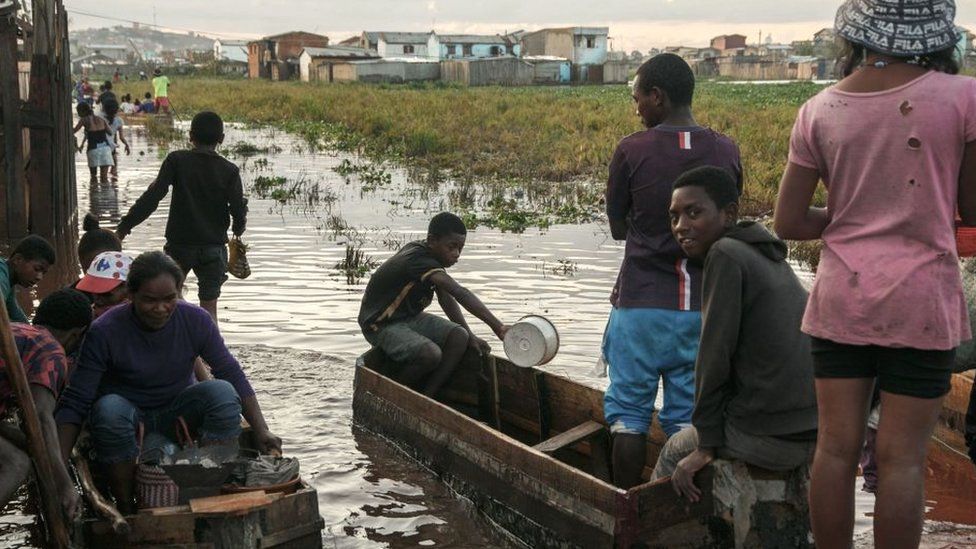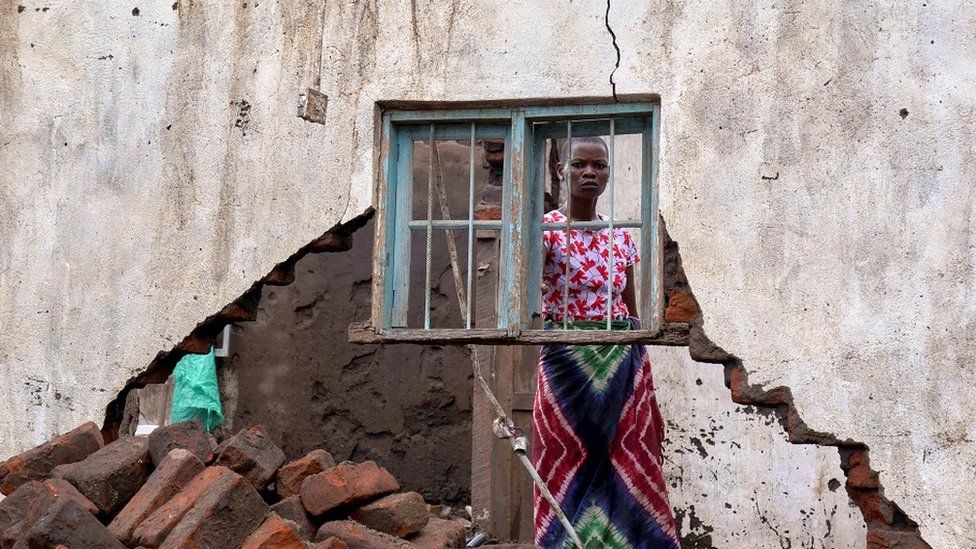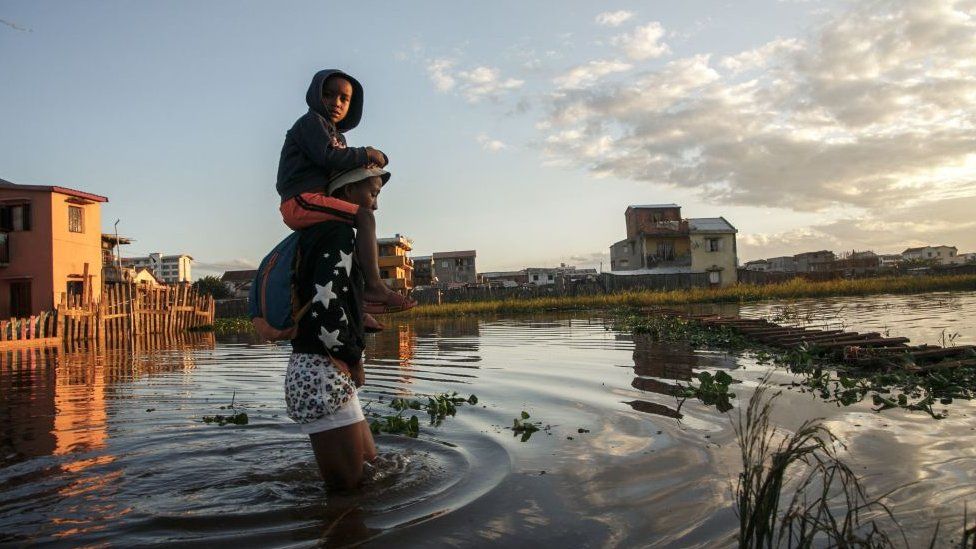Mozambique : Storm Ana - “ a blunt reminder that the climate crisis is very much a reality and children are most affected.” : BBC News / UNICEF
 |
| Maria Luisa Fornara |
Storm Ana: Deadly Africa storm shows climate crisis reality
The death toll from the destruction caused by Storm Ana has risen to 86.
Rescue workers are trying to reach tens of thousands who have been cut off as roads and bridges have been washed away in Madagascar, Mozambique and Malawi.
Authorities are now watching to see if a second storm - Batsirai - will hit the continent next week.
In Mozambique, where 18 people have been killed and 120,000 people affected, Maria Luisa Fornara, from the UN children's fund Unicef, described Storm Ana as a "blunt reminder" of the impact that climate change is having.
UN Secretary General António Guterres said more investment was needed to "protect and save lives".
 |
Image In one neighbourhood of Madagascar's capital, Antananarivo, people are having to use canoes to reach their flooded homes - source, AFP |
"I lost my fishing boat, it was swept away by the strong wind," Abdul Ibrahim, a fisherman in Mozambique's Nampula province told AFP news agency.
"I have never seen anything like this before. It will be difficult for me to recover."
Seeking temporary shelter in a classroom for her and her two children, Maria Jose told AFP that the first winds had blown away her house.
"I have nothing left, I lost everything."
Some of the infrastructure that had been rebuilt after Cyclone Idai in 2019 has been destroyed again.
In Madagascar, which was the first country to be hit on Monday, the death toll now stands at 48 and some 72,000 are reported to have lost their homes.
"I am very sad because we work like crazy to make money and now our house is destroyed," one woman said surveying the damage that was caused.
"I have never seen anything like this before. It will be difficult for me to recover."
Seeking temporary shelter in a classroom for her and her two children, Maria Jose told AFP that the first winds had blown away her house.
"I have nothing left, I lost everything."
Some of the infrastructure that had been rebuilt after Cyclone Idai in 2019 has been destroyed again.
In Madagascar, which was the first country to be hit on Monday, the death toll now stands at 48 and some 72,000 are reported to have lost their homes.
"I am very sad because we work like crazy to make money and now our house is destroyed," one woman said surveying the damage that was caused.
 |
| Many people in Malawi, like elsewhere in the region, are now having to rebuild their destroyed homes |
The disaster management agency said families had been forced to carry the dead to burials because roads had been cut off.
A resident in the southern town of Chikwawa, described how fellow villagers spent two days holding on to trees as the waters swept through.
The weather authorities are keeping a close eye on Tropical Storm Batsirai which has formed in the Indian Ocean and is moving westwards.
....
MAPUTO, 27 January 2022 – UNICEF is deploying staff and preparing medical and nutrition supplies, water, sanitation and hygiene kits, as well as setting up temporary learning spaces to support children and families affected by Tropical Storm Ana, which made landfall on central and northern Mozambique on 24 January.
More than 45,000 people, including 23,000 women and children, are likely to need humanitarian assistance in the aftermath of the storm that hit Nampula, Zambezia, Tete, Niassa, Sofala and Manica provinces.
The powerful storm caused floods, damaged almost 10,500 homes as well as public infrastructure, including bridges, powerlines, schools, water systems, and health facilities. According to the Mozambican National Institute for Disaster Risk Reduction and Management (INGD), as of 26 January, 12 health facilities and 346 classrooms (137 schools) have been damaged or destroyed, leaving 27,383 students without a place to learn, in advance of the new school year that is scheduled to start on Monday 31 January. These figures are expected to increase as teams on the ground are still assessing the situation.
Given that Mozambique is in its rainy season, the situation could deteriorate quickly if another tropical depression or cyclone brings significant additional rains to already full rivers and dams.
“We are working together with the Mozambican government and our partners to provide life-saving assistance to children and their families in the affected areas,” said Maria Luisa Fornara, UNICEF Representative in Mozambique. “This latest storm to hit Mozambique is a blunt reminder that the climate crisis is very much a reality and children are most impacted by climate-related severe weather events.”
In the next few days, UNICEF’s emergency teams will begin distributing essential supplies such as buckets, soap and water purification tablets, ready-to-use therapeutic food for malnourished children, and will set up temporary learning spaces where children whose schools have been damaged/destroyed can learn and play safely. UNICEF has been sharing protective and preventive messages to mitigate the impact of the storm through provincial and local radios, multimedia mobile units and U-Report.
UNICEF estimates that it will need US$ 3.5 million to respond to the immediate needs of the populations affected by Tropical Storm Ana in Mozambique. The organization is using its prepositioned supplies and mobilizing internal funds.
From 2016 to 2021, the country has faced two severe drought events and eight tropical storms, including the major Cyclones Idai and Kenneth that hit the country in 2019 within a time span of six weeks and affected 2.5 million people. According to the disaster risk assessment tool INFORM, Mozambique ranks 9 out of 191 countries globally due to the country’s high vulnerability to hazards, exposure to risks, and lack of coping capacity.
MAPUTO, 27 January 2022 – UNICEF is deploying staff and preparing medical and nutrition supplies, water, sanitation and hygiene kits, as well as setting up temporary learning spaces to support children and families affected by Tropical Storm Ana, which made landfall on central and northern Mozambique on 24 January.
More than 45,000 people, including 23,000 women and children, are likely to need humanitarian assistance in the aftermath of the storm that hit Nampula, Zambezia, Tete, Niassa, Sofala and Manica provinces.
The powerful storm caused floods, damaged almost 10,500 homes as well as public infrastructure, including bridges, powerlines, schools, water systems, and health facilities. According to the Mozambican National Institute for Disaster Risk Reduction and Management (INGD), as of 26 January, 12 health facilities and 346 classrooms (137 schools) have been damaged or destroyed, leaving 27,383 students without a place to learn, in advance of the new school year that is scheduled to start on Monday 31 January. These figures are expected to increase as teams on the ground are still assessing the situation.
Given that Mozambique is in its rainy season, the situation could deteriorate quickly if another tropical depression or cyclone brings significant additional rains to already full rivers and dams.
“We are working together with the Mozambican government and our partners to provide life-saving assistance to children and their families in the affected areas,” said Maria Luisa Fornara, UNICEF Representative in Mozambique. “This latest storm to hit Mozambique is a blunt reminder that the climate crisis is very much a reality and children are most impacted by climate-related severe weather events.”
In the next few days, UNICEF’s emergency teams will begin distributing essential supplies such as buckets, soap and water purification tablets, ready-to-use therapeutic food for malnourished children, and will set up temporary learning spaces where children whose schools have been damaged/destroyed can learn and play safely. UNICEF has been sharing protective and preventive messages to mitigate the impact of the storm through provincial and local radios, multimedia mobile units and U-Report.
UNICEF estimates that it will need US$ 3.5 million to respond to the immediate needs of the populations affected by Tropical Storm Ana in Mozambique. The organization is using its prepositioned supplies and mobilizing internal funds.
From 2016 to 2021, the country has faced two severe drought events and eight tropical storms, including the major Cyclones Idai and Kenneth that hit the country in 2019 within a time span of six weeks and affected 2.5 million people. According to the disaster risk assessment tool INFORM, Mozambique ranks 9 out of 191 countries globally due to the country’s high vulnerability to hazards, exposure to risks, and lack of coping capacity.

Comments
Post a Comment
If you are a member of XUNICEF, you can comment directly on a post. Or, send your comments to us at xunicef.news.views@gmail.com and we will publish them for you.